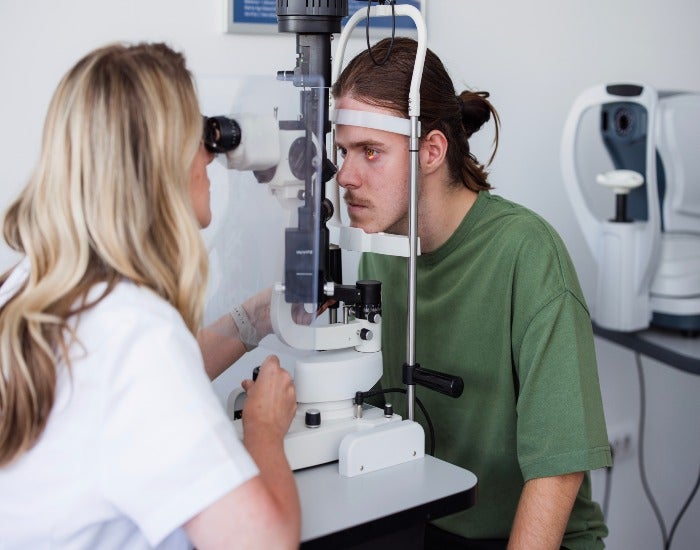Graves’ Eye Disease Treatment in Derry, NH & Surrounding Area
Do you live with Graves’ disease? This autoimmune condition often causes swelling and other symptoms in the eye area. While Graves’ eye disease is not usually serious and can go away on its own, it may still have significant impacts on a patient’s quality of life. Fortunately, Spindel Eye Associates is here to help Derry, NH residents relieve the symptoms of Graves’ eye disease. Learn more about this condition and how we address it.
What Is Graves’ Eye Disease?
Graves’ eye disease is an inflammatory condition affecting the eye muscles and the fatty tissue behind the eye. This inflammation can lead to various symptoms, including bulging eyes, double vision, and eye pain. Although it primarily affects those with Graves’ disease, it can occasionally occur in individuals with other thyroid conditions or even in those with no thyroid issues at all.

Get Familiar With Graves’ Eye Disease Symptoms
Patients with Graves’ eye disease report varying degrees of symptoms, and the team at Spindel Eye Associates can help you address them. While most cases are mild, symptoms can last up to two years. If you’re concerned about developing this condition, get familiar with these symptoms of Graves’ eye disease:
- Bulging eyes
- Double vision
- Eye pain
- Redness and swelling in the eyelids
- Dry eyes
- Light sensitivity
- Watery eyes
- Difficulty closing eyes
What Causes Graves’ Eye Disease?
Graves’ eye disease is an autoimmune disorder, meaning the body’s immune system mistakenly attacks its own tissues. In this case, the immune system targets the muscles and tissues around the eyes. The exact cause of this immune response is not entirely understood, but it is believed to involve a combination of genetic and environmental factors. Often, it is associated with hyperthyroidism, particularly Graves’ disease. However, patients don’t have to have a thyroid condition to develop the disease. Luckily, Graves’ eye disease isn’t contagious, so you don’t have to worry about catching or spreading it.
Diagnosing This Condition
Diagnosing Graves’ eye disease involves a comprehensive eye examination by an ophthalmologist or an eye specialist. If an eye exam reveals signs of this condition, your provider may order additional testing, such as:
- Visual acuity tests to measure the clarity of vision.
- Eye movement tests to assess how well the eyes move and coordinate.
- Imaging studies to evaluate the extent of inflammation and tissue changes in the eye socket.
- Blood tests to check thyroid function and antibody levels.
How We Treat Graves’ Eye Disease
Once diagnosed, Graves’ eye disease treatment will depend on the severity of the condition and the specific symptoms present. The goal is to manage inflammation, protect vision, and improve the cosmetic appearance of the eyes. Regular follow-up appointments are essential to monitor the progression of the disease and adjust treatment as needed. We might incorporate the following into your treatment plan:
- Medications—Certain medications can help reduce inflammation and swelling around the eyes.
- Eye Drops—To relieve dryness and discomfort, over the counter or prescription eye drops may be helpful.
- Lifestyle Changes—Many Graves’ eye disease symptoms can be managed with lifestyle changes. We often recommend wearing sunglasses outside to combat light sensitivity and sleeping with an eye mask if you have trouble closing your eyes.
- Glasses—Patients with double vision often benefit from special prescription lenses.
- Radiation Therapy—Some patients find success with radiation treatments that reduce swelling around the eyes.
- Surgery—If Graves’ disease is negatively impacting your vision, surgery may be necessary. A typical Graves’ eye disease surgery makes the eye socket bigger, removing pressure on the optic nerve and guiding the eye back into the correct position. We can discuss surgery and other procedures in person at your appointment.
Know If You’re at Increased Risk
Graves’ disease and eye problems can occur in nearly anyone. In fact, about one-third of the population will develop some of these symptoms. However, several factors can increase the risk of Graves’ eye disease, including:
- Gender—Women are more likely to develop Graves’ eye disease than men.
- Age—The condition usually develops before age 40.
- Smoking—Smokers are at a higher risk of more severe forms of Graves’ disease.
- Family History—Does a close family member have an autoimmune or thyroid disorder? You may be more susceptible to Graves’ eye disease.
Treating a Range of Other Eye Conditions
At Spindel Eye Associates, we proudly treat a range of eye conditions beyond Graves’ disease. Our specialists and financing team are here to help ensure you get proper treatment for all these conditions, among others:
- Dry eyes
- Astigmatism
- Myopia
- Conjunctivitis
- Computer vision syndrome
- Color blindness
Get in Touch With Spindel Eye Associates
Whether you’re worried about Graves’ eye disease or are simply due for a yearly exam, Spindel Eye Associates is here for you. Our specialists provide world-class customer service to residents in Derry and surrounding areas. Contact us today to set up your first appointment.
